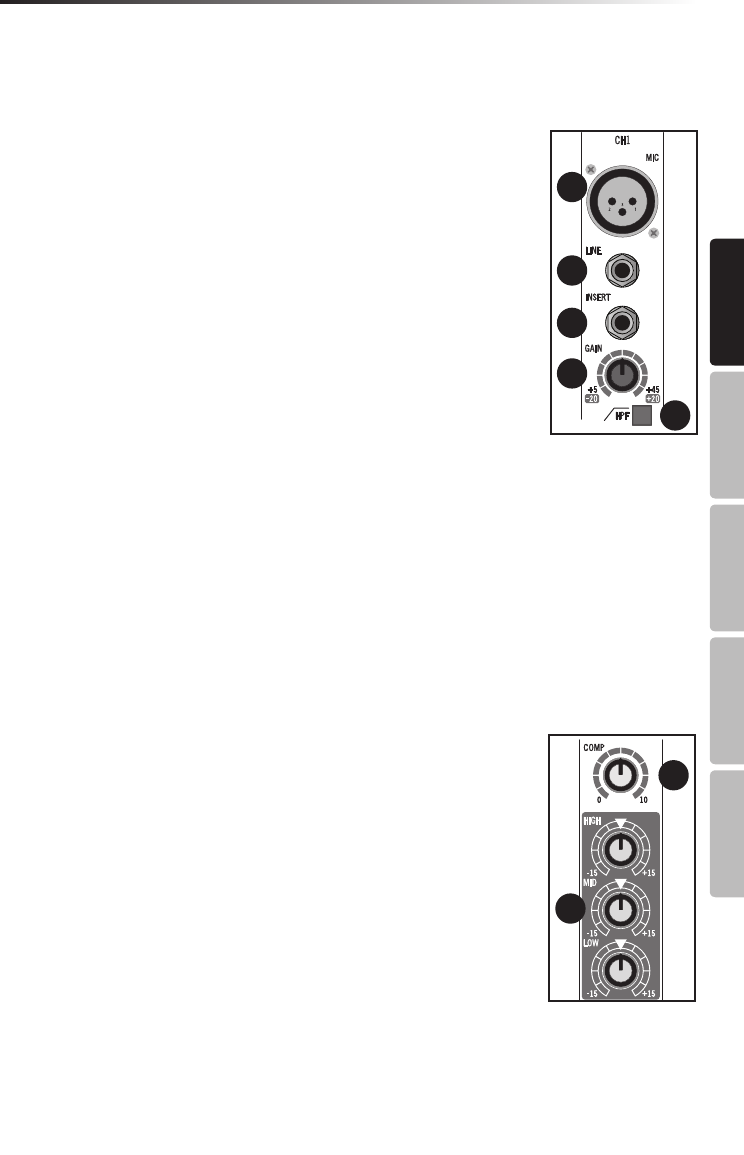
11
MXP144/MXP144FX
ENGLISH
FRANÇAISDEUTSCHEESPAÑOLITALIANO
Mono Input Channel Section
The following section details four mono input channels.
1. MIC Inputs - Use these balanced XLR inputs to connect
low Impedance microphones and low level signals from
direct boxes. The MIC inputs feature +48V phantom
power, allowing you to use condenser microphones.
XLR Connector pin-out - Pin 1: Ground, Pin 2: Hot (+),
Pin 3: Cold (-)
2. Line Level Input - Use these balanced TRS ¼” inputs to
connect synthesizers, drum machines, effects processors
or any line-level signal. You can connect balanced and
unbalanced devices to these inputs.
TRS phone jacks Connector pin-out - Sleeve: Ground,
Tip: Hot (+), Ring: Cold (-)
3. INSERT (Send and Return) Jack - The ¼” TRS (Tip, Ring,
Sleeve) INSERT jack is for connecting outboard effects processors directly
on the channel input. The signal is sent on the tip (the Send) and returns
on the ring (the Return) of the connector.
4. GAIN Control - Variable GAIN control with a range of +5 to +45dB on the
MIC input and -20 to +20dB on the LINE input.
5. HPF Switch - The high pass filter rolls off the low frequencies from the
XLR MIC inputs from 80Hz and below at the rate of 12dB per octave. The
high pass filter allows you to remove the lower frequencies that you don’t
want the microphone to pick up. In live sound applications, the high pass
filter is useful for removing stage rumble.
6. COMP Control - The COMP knob adjusts the level of
compression applied to the channel. As the COMP knob
is turned clockwise, the compression ratio is raised and
the output gain is adjusted accordingly. The dynamic
range of the channel is narrowed, where softer signals
will be magnified and loud signals will be subdued to sit
better in the mix. Too much compression can create a
pumping effect, eliminate all dynamic range, and lead
to feedback.
7. Equalizer (HIGH, MID, and LOW) - This three-band
equalizer allows you to contour a channel’s high, mid,
and low frequency bands. When the control is set to the 12 o’clock
(detent) position, there is no effect on the signal. Turning the controls
fully clockwise will raise the level of the frequency band +15 dB, while
turning the controls fully counterclockwise will lower the level of the
frequency band -15 dB.
Top Panel Controls
1
2
3
4
5
6
11
7
8
9
10
12
13
1
2
3
4
5
6
11
7
8
9
10
12
13


















